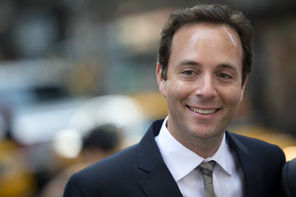Originally published August 2, 2014 at 3:01 PM | Page modified August 4, 2014 at 6:59 AM
Zillow CEO Rascoff plays the long game
Active dealmaker and social-media participant Spencer Rascoff has been eyeing rival real-estate website Trulia for years.
Bloomberg News
Spencer Rascoff
Age: 38
Compensation: In 2013, salary of $473,000 and option awards valued at $10.1 million.
Education: B.A. in Government from Harvard University
Other roles: Board member at publicly traded travel services website TripAdvisor and ‘flash sale’ site zulily, as well as privately held Julep Beauty. Also on advisory board at Seattle Children’s Research Institute
Source: Zillow filings
Pulling away: 5 highest-paid CEOs
Stock benefits separated the highest-paid executives of Northwest public companies from the rest.

1John Legere, T-Mobile US
2Darrell Cavens, zulily
3Howard Schultz, Starbucks
4Mark Parker,
Nike
5Spencer Rascoff, Zillow
1John Legere — T-Mobile US
2013 total pay: $29.2 million
Cash pay: $6.6 million
Equity pay: $22.5 million
Market cap (12/31): $29.97 billion
Profit FY 2013: $35 million
Number of employees: 40,000
2Darrell Cavens — zulily
2013 total pay: $27.3 million
Cash pay: $350,000
Equity pay: $26.9 million
Market cap (12/31): $5.13 billion
Profit FY 2013: $12.9 million
Number of employees: 1,110
3Howard Schultz — Starbucks
2013 total pay: $17.2 million
Cash pay: $3.7 million
Equity pay: $13.3 million
Market cap (12/31): $59 billion
Profit FY 2013: $8.3 million
Number of employees: 182,000
4Mark Parker — Nike
2013 total pay: $15.4 million
Cash pay: $7.1 million
Equity pay: $7.7 million
Market cap (12/31): $69.3 billion
Profit FY 2013: $2.5 billion
Number of employees: 48,000
5Spencer Rascoff — Zillow
2013 total pay: $10.6 million
Cash pay: $473.570
Equity pay: $10.1 million
Market cap (12/31): $3.2 billion
Loss FY 2013: $12.5 million
Number of employees: 817
Source: Equilar and SEC documents
Illustration: David Miller / The Seattle Times
More
![]()
While Zillow Chief Executive Officer Spencer Rascoff began talks to purchase No. 2 real-estate website Trulia in June, the roots of the deal stretch back at least eight years.
Rascoff, 38, said he started thinking about combining the two companies a year after Zillow went online in 2006. He then began actively discussing the prospect of a deal internally three years ago. While formal talks didn’t begin until recently, Rascoff got to know Trulia CEO Pete Flint early on and kept in close touch with him, according to Rich Barton, Zillow’s executive chairman, who passed the CEO job to Rascoff in 2010.
“When I set my mind to something, I can be persistent and patient,” Rascoff said. “The reason I’ve always championed this combination is I think it’s very important to operate multiple real-estate brands.”
His long-held ambition for a deal was consummated last week, when Seattle-based Zillow said it would acquire San Francisco-based Trulia in an all-stock transaction valued at about $3.5 billion.
The purchase fits with the CEO’s strategy of creating a family of real-estate brands helmed by Zillow, with Trulia joining New York property website Streeteasy.com and apartment-search site HotPads as part of the portfolio.
Rascoff has been methodically acquiring disparate sites after cultivating some tie-ups for years; with StreetEasy, he said he eyed it for five years before pouncing.
Since he took Zillow’s helm in 2010, the largest U.S. real-estate website — which had made no purchases in its first few years of operations — has done nine acquisitions. With more people hunting for homes online and property agents gravitating to the Web to appeal to clients, Rascoff is seeking to ensure Zillow remains at the forefront of the shifting behavior, said people who know and have worked with him.
“He never thinks things can’t be done,” said Zillow Chief Marketing Officer Amy Bohutinsky, who has worked with Rascoff for more than a decade. “If there’s just the slightest chance of it happening, he’ll say, let’s go do it.”
Rascoff’s challenge now will be to integrate Trulia into the Zillow family and make sure there’s enough differentiation between the sites to appeal to the broadest audiences and advertisers. At some point, the CEO will also have to turn the companies into moneymaking operations, since both are unprofitable.
Rascoff said he recognizes there’s a long road ahead, given that Trulia is Zillow’s largest-ever deal.
“This is a very large acquisition and it will take time for it to close and take time for it to make it sing,” he said.
Rascoff, who majored in government at Harvard University, started his career in finance in 1997. After a stint at Goldman Sachs Group as an investment banker, Rascoff worked at private equity firm TPG Capital. While there, he co-founded online discount travel company Hotwire in 1999, which later became part of Expedia.
At Expedia, Rascoff met Barton, who had spun off the travel site from Microsoft and then founded Zillow in 2005. Barton hired Rascoff to run Zillow’s marketing that same year.
When the real-estate website started bringing in revenue through advertising and expenses started to build, Rascoff became chief financial officer in 2006, later taking on the title of chief operating officer in 2008 before becoming CEO.
“Spencer was the first or second person we called up to bring on board” to Zillow, Barton said. “Even before day one, I targeted Spencer as the guy who would hopefully replace me as CEO.”
Zillow’s portfolio strategy has been in development for the past few years. The company, which provides tools for people to find homes online and which primarily generates revenue through advertising, has been looking at other services they could provide outside of promotions.
“Having multiple brands allows certain brands to appeal to certain users so we can grow our audience and grow the number of homebuyers and renters,” Rascoff said.
With Trulia, discussions heated up seven weeks ago when Zillow approached its competitor, Rascoff said. Trulia was code-named Tiger and Zillow code-named Zebra, with communications about the deal requiring the password “jungle,” he said.
Rascoff is highly communicative as CEO, answering queries on jobs and career community Glassdoor, posting videos on YouTube and tweeting prolifically. Barton said he “dragged” Rascoff onto Twitter in 2009. While the CEO was initially reluctant to adopt another communication platform that he would have to check and respond to, Rascoff soon embraced it, Barton said.
Since then, Rascoff has used Twitter and Facebook to amass questions from the American public for a discussion about housing last year with President Obama, an event that helped build Zillow’s profile.
“He’s one of the top five CEOs on Twitter, just in terms of the amount he uses the platform and the creative ways he uses the platform,” said Bill Gurley, a Zillow board member and a general partner at venture-capital firm Benchmark.
The CEO is also known for his multitasking. Jane Park, CEO of Seattle-based e-commerce startup Julep Beauty, where Rascoff is a board member, said she once had a meeting with him where he texted her to bring sneakers. When she got to his office, Rascoff invited her to hop onto a treadmill so they could both exercise while they talked business.
“I had to try to balance having this substantive conversation about our hardest issues while walking on a treadmill and you’re talking to Spencer Rascoff, who thinks really fast,” Park said.
Rascoff only needs a few hours of sleep a night, said Barton. Barton said he once had to tell Rascoff during a performance review at Expedia to stop sending emails to his team at two or three in the morning.
“He’s one of the most productive people,” said Karl Peterson, a senior partner at TPG who recruited Rascoff to the private equity firm and helped found Hotwire. “Anything we needed to get done, we’d give to Spencer.”
With Zillow, Rascoff said he’s looking 10 years to 20 years ahead. To hit home how the company should be thinking long term, he said he has made it taboo to discuss or look up Zillow’s day-to-day stock price.
As Zillow builds out its family of sites, more deals are also likely, Rascoff added.
“It will take many years for this to play out as my plans unfold,” Rascoff said. “This certainly won’t be our last acquisition, I can assure you of that.”
 Four weeks for 99 cents of unlimited digital access to The Seattle Times. Try it now!
Four weeks for 99 cents of unlimited digital access to The Seattle Times. Try it now!

















